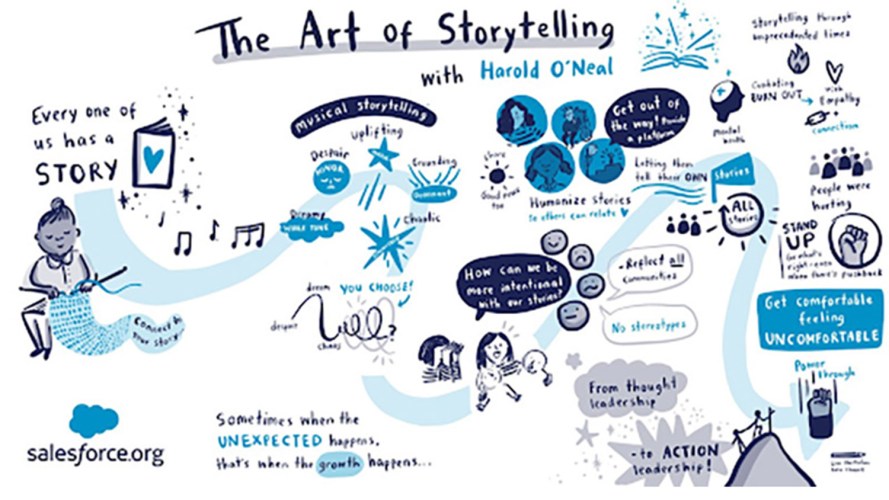Last week, I was honored to host a virtual roundtable for a small group of nonprofit marketing and communications executives on The Art of Storytelling & Brand Identity. Our special guest speaker was master storyteller, pianist, and composer Harold O’Neal, a fellow of the Royal Society of the Arts and creative expert on the Academy Award-winning Pixar film Soul. Harold led an exercise that challenged us to find ways to be more intentional with our storytelling. He shared some of his journey on his way to success, reminded us that everyone has a story and that the way we tell that story shapes our world.
Harold’s challenge to the group — to write a short story and assign one of five types of musical chords to each sentence — helped us explore what emotions we look to evoke when we share stories. Using his piano to underline participants’ voices as they shared their stories, he demonstrated how different chords call forth specific feelings and provide a shortcut directly to our emotional center.
Harold’s presentation and exercise set the tone (if you’ll forgive the pun) for a vibrant and insightful discussion among participants. We talked about how storytelling has evolved at their organizations during this pandemic, ways to counteract burnout and support mental health, and how they are amplifying the voices of their constituents and supporters to build a more profound sense of community. Here are my top five insights from that discussion.
1. Let people tell their own stories
National or umbrella organizations can support local branches or individual chapters by lifting up their community-specific stories to become part of an overarching and authentic narrative. Or they can provide a platform where constituents can share their journeys, express their unique voices, and connect with others whose experiences may mirror their own. There is value and impact in stepping back and letting people tell their own stories in their own words.
2. Leaders must demonstrate leadership in the area of mental health
It’s no longer enough to tell people to “do yoga and exercise”; leaders must demonstrate that it is necessary to take time to care for ourselves. By showing that we can walk the walk, we open space for others to do the same.
3. Get comfortable being uncomfortable
Social justice issues such as systemic racism have taken the spotlight in recent years. It has become clear that organizations must make a conscious decision to reflect all of the various communities they serve in their storytelling. Intentional storytelling remains not just the right thing to do but the smart thing to do, bringing in new donors and supporters to the cause as they see themselves represented and celebrated. We must stand in what is right and drive this change together.
4. Provide hope for the future
Right now, pandemic restrictions may be preventing some organizations from doing all the work they want to do on behalf of their constituent communities. But it is essential to keep our vision steadfast, plan wherever possible, and share those plans with those we serve — to offer them a glimmer of hope for what the future may hold. Good news helps us keep moving forward.
5. Emphasize emotions over words
There’s tremendous power in even the most straightforward short story when we focus on emotions rather than words. By deciding what type of musical chord each part of our story represents, we choose the emotion we want to associate with it, which informs how we craft our message and how others experience it. No one is suggesting we set all of our brand and organizational stories to music. Instead, we can use music as a way to set our intentions for the experiences we seek to convey through story.
It was an honor to lead this critical discussion and celebrate the work, resilience, and leadership, not only of the CMOs who attended this event but of our greater Salesforce.org community. I continue to reflect on how fortunate I am that my purpose as CMEO of Salesforce.org is to elevate our world-changing customers’ stories to inspire and drive the real change needed now more than ever in the world.
Team Earth has landed
We believe that business is the greatest platform for change, and success should be for everyone on Earth and the planet itself. Because the new frontier? It’s right here.































